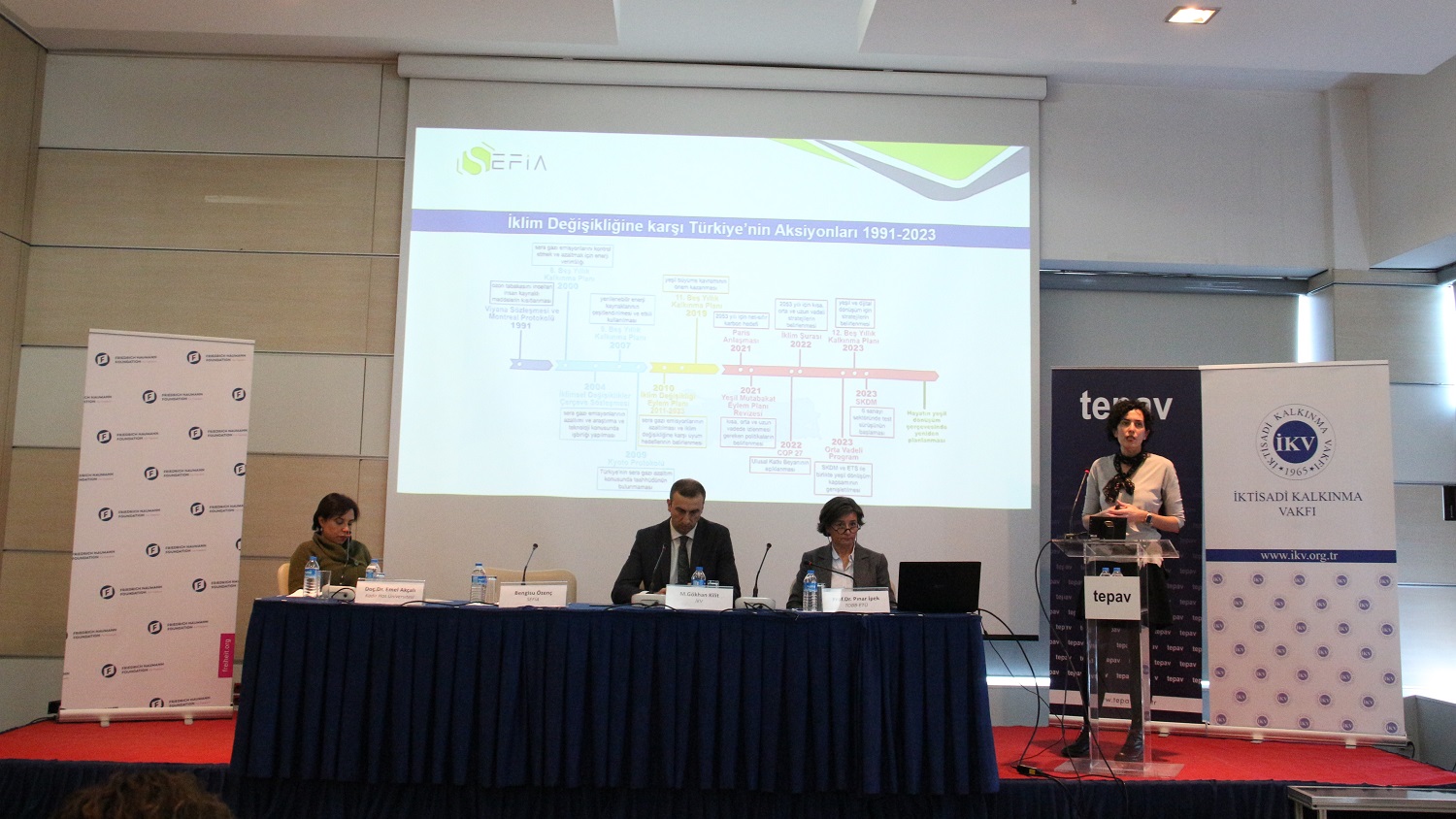Green Deal
EU Green Deal and its Effects on Turkiye’s Climate Policy

Organized by the Economic Development Foundation (IKV) and the Friedrich Naumann Foundation in cooperation with the Economic Policy Research Foundation of Turkey (TEPAV) and the Istanbul Policy Center (IPC), the "EU Green Deal and its Effects on Turkiye’s Climate Policy" meeting provided participants with valuable insights on changing environmental policies and their impact on Turkey in various fields. Participants from different backgrounds such as academics, students, experts and embassy representatives benefited from the leading names in their fields during the meeting, which consisted of 3 different sessions.
The meeting started with the opening speeches of Prof. Dr. Güven Sak, Founding Director of TEPAV, and Prof. Dr. Fuat Keyman, Director of IPM, who emphasized the importance of Turkey's adaptation to the green transformation process. Afterwards, Abdülkadir Bektaş, Vice President of the Ministry of Climate Change, provided valuable information to the participants about Europe's Emissions Trading System (ETS). Mr. Bektaş stated that Turkey is making an active effort to reach zero emission level by 2053 and as of 2024, the "Enhanced Transparency Framework for Action and Support" will enter into force under the Paris Agreement, which is of great importance for reporting processes.
The European Green Deal and the Border Carbon Regulatory Mechanism (BCDRM) were discussed in depth and moderated by Ambassador Bozkurt Aran. Dr. Akın Ayberk Çilekoğlu, who took the first floor, mentioned that great benefits can be achieved when looking at the CCSM from the perspective of the European Union. These included the importance of climate change on a global scale, preventing carbon leakage and being able to hold on to the competitive market. The session also included a presentation by Dr. Ahmet Aydemir on the past and future of sustainability. Afterwards, Assoc. Prof. Dr. Ahmet Atıl Aşıcı talked about the process of the European Bank for Reconstruction and Development supported CBAM in Turkey. Mentioning that the highest possible revenue can be obtained through the implementation of a nationwide Emissions Trading System, Mr. Işık said that the revenue obtained can be used for green transformation.
The second session was moderated by M. Gökhan Kilit, Deputy Secretary General of IKV. Bengisu Özenç, Founding Director of SEFIA, stated that the zero-emission process in Turkiye has accelerated with the Green Deal and that this goal is of great importance for a country that has taken concrete steps on climate policies for the first time. Afterwards, Assoc. Prof. Dr. Emel Akçalı shared her insights on the local adaptation processes of the European Union's environmental policies in Türkiye, including the Green Deal. As the last speaker, Prof. Dr. Pınar İpek talked about the energy crisis after the Russia-Ukraine war and Europe's "REPower EU" response to the crisis.
Moderated by Nilgün Arısan Eralp, Director of TEPAV EU Studies Center, last session discussed the impact of the green transformation process on the Customs Union and Turkey's trade and climate policies. Bahar Güçlü, Deputy Director General of the Ministry of Trade's Directorate General for International Agreements and EU Affairs, talked about the fact that products are now subject to sustainability standards beyond quality standards. Prof. Dr. Sanem Baykal, the next speaker, said that sustainability goals do not promote an obstacle to the Customs Union, on the contrary, they improve the mechanism as a dynamic goal. Afterwards, IKV Secretary General Assoc. Prof. Dr. Çiğdem Nas mentioned that EU funds can be a good source for the green transformation process and argued that this process will also positively affect Turkey's international relations. The last speaker of the session and the meeting, IPM Director Prof. Dr. Fuat Keyman stressed the importance of compliance with the Green Deal for an efficient economic growth model. Keyman emphasized that the Climate Law should be enacted as soon as possible and state strategies should change accordingly and concluded this productive meeting.
The meeting, organized on Turkey's climate policies and the impacts of the European Green Deal, discussed in detail the potential impacts of the green transformation process on various areas. Participants gained valuable insights on these topics through the presentations of speakers from various backgrounds. Turkey's adaptation to the green transformation process and its steps in this process was one of the important points emphasized by the speakers.
